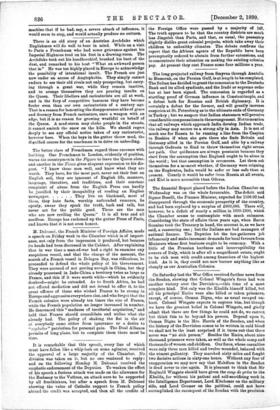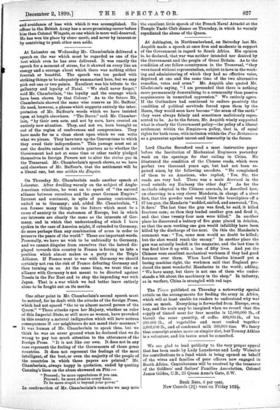On Saturday last the War Office received further news from
the Soudan, showing that Colonel Wingate's force had won another victory over the Dervish's,—this time of a most complete kind. Not only was the Khalifa himself killed, but all his principal Emirs were also killed or taken prisoners, except, of course, Osman Digna, who as usual escaped un- hurt. Colonel Wingate expects to capture him, but though we have the greatest belief in Colonel Wingate, and gladly admit that there are few things he could not do, we cannot but think this to be beyond his powers. Depend upon it, Osman Digna is the Mrs. Harris of the Soudan, and when the history of the Dervishes comes to be written in cold blood we shall not be the least surprised if it turns out that there never was "no sich person." Besides the Emirs, about nine thousand prisoners were taken, as well as the whole camp and thousands of women and children. Our force, whose casualties were only three men killed and twelve wounded, behaved with the utmost gallantry. They marched sixty miles and fought two decisive actions in sixty-one hours. Without any fear of exaggeration we may now say that Mahdism in the Soudan is dead never to rise again. It is pleasant to think that Sir Reginald Wingate should have given the coup d,e greice to the Khalifa, for without his patient and self-sacrificing work in the Intelligence Department, Lord Kitchener on the military side, and Lord Cromer on the political, could not have accomplished the reconquest of the Soudan with the precision
and avoidance of loss with which it was accomplished. No officer in the British Army has a more promising career before him than Colonel Wingate, or one which is more well-deserved, He has won his place by sheer merit, and never by interest or by contriving to push other men aside.























































 Previous page
Previous page